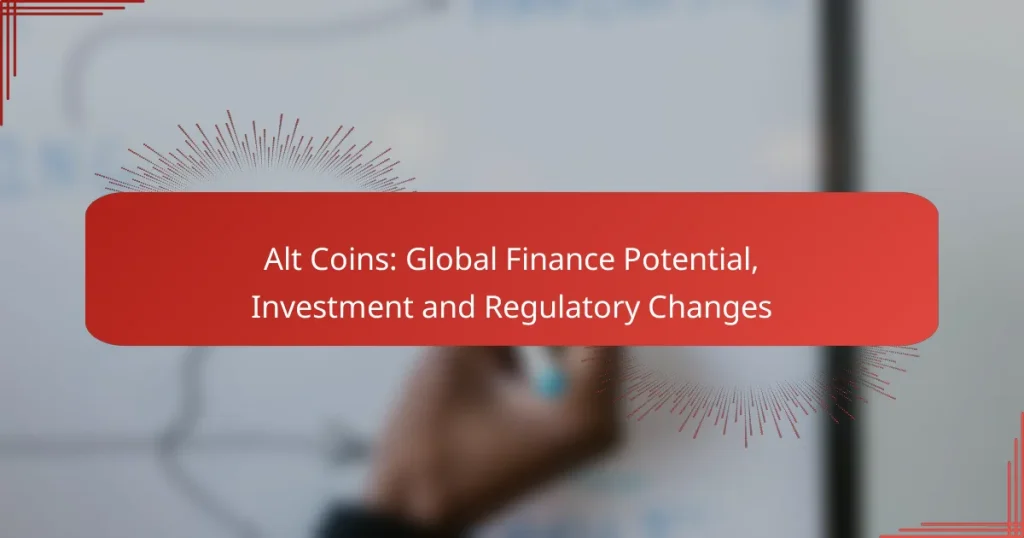Altcoins are poised to transform global finance by leveraging innovative technologies and decentralized systems, which can improve transaction efficiency and promote financial inclusion. As of 2023, cryptocurrencies like Ethereum, Cardano, and Solana stand out as promising investment options, each offering distinct advantages. However, ongoing regulatory changes in the U.S. and Europe are crucial in shaping the altcoin market, presenting both opportunities and challenges for investors.
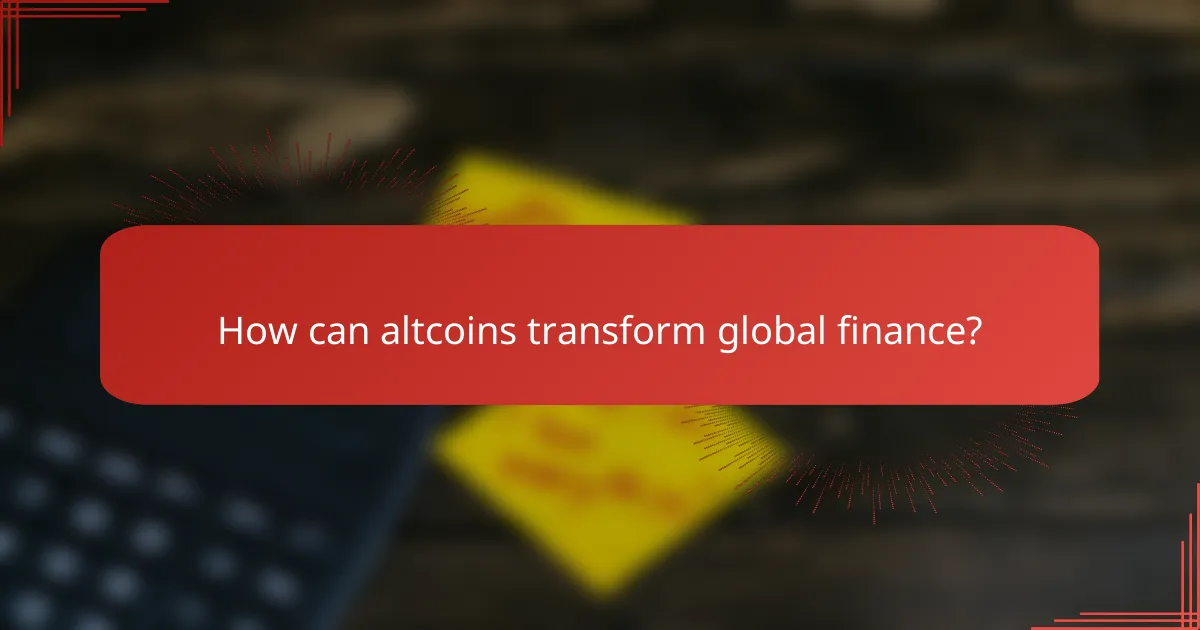
How can altcoins transform global finance?
Altcoins have the potential to significantly reshape global finance by introducing innovative technologies and decentralized systems. They can enhance transaction efficiency, reduce costs, and promote financial inclusion across various demographics.
Decentralized finance (DeFi) applications
Decentralized finance (DeFi) applications leverage altcoins to create financial services without traditional intermediaries. These platforms enable users to lend, borrow, and trade assets directly, often with lower fees and faster transaction times compared to conventional banks.
For instance, using DeFi protocols, individuals can earn interest on their cryptocurrency holdings or access loans without credit checks. Popular DeFi platforms include Aave and Uniswap, which facilitate these services through smart contracts on blockchain networks.
Cross-border transactions
Altcoins facilitate cross-border transactions by enabling faster and cheaper transfers compared to traditional banking systems. With altcoins, users can bypass currency conversion fees and lengthy processing times associated with international wire transfers.
For example, using stablecoins like USDC or DAI allows users to send money across borders in minutes, with minimal fees. This efficiency is particularly beneficial for remittances, where traditional services may charge high fees, often exceeding 7% of the transaction amount.
Financial inclusion for unbanked populations
Altcoins can promote financial inclusion by providing access to financial services for unbanked populations. Many individuals in developing countries lack access to traditional banking systems, but they can use smartphones to interact with altcoin platforms.
For example, mobile wallets that support altcoins allow users to save, send, and receive funds without needing a bank account. This can empower millions of people to participate in the global economy, improving their financial stability and opportunities.
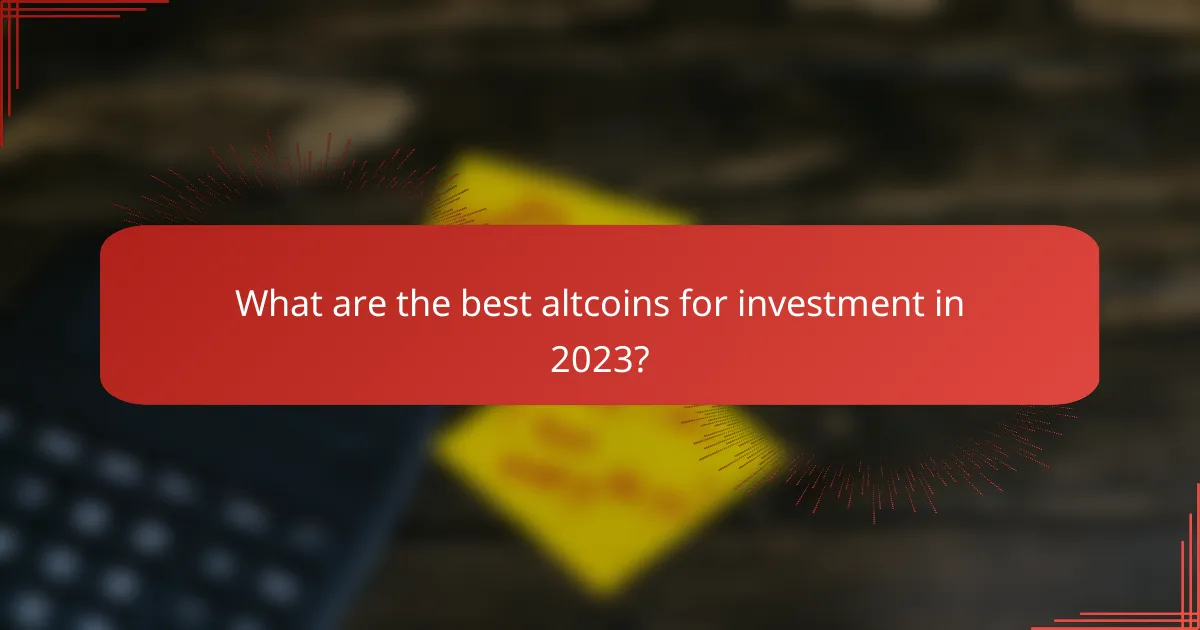
What are the best altcoins for investment in 2023?
In 2023, some of the best altcoins for investment include Ethereum, Cardano, and Solana. Each of these cryptocurrencies offers unique features that cater to different investment strategies and market needs.
Ethereum (ETH) for smart contracts
Ethereum is the leading platform for smart contracts, allowing developers to build decentralized applications (dApps) on its blockchain. Its robust ecosystem supports a wide range of projects, from finance to gaming, making it a versatile investment option.
Investors should consider Ethereum’s transition to a proof-of-stake model, which aims to improve scalability and reduce energy consumption. This shift may enhance its value proposition as more users adopt the platform.
Cardano (ADA) for scalability
Cardano is designed with scalability in mind, utilizing a unique proof-of-stake consensus mechanism called Ouroboros. This allows it to process transactions more efficiently than many older blockchains, making it a strong contender for future growth.
Investors should pay attention to Cardano’s ongoing development and partnerships, which aim to expand its use cases in various sectors, including education and supply chain management. Its focus on academic research adds credibility to its technology.
Solana (SOL) for speed
Solana is known for its high-speed transactions, capable of processing thousands of transactions per second at a low cost. This efficiency makes it an attractive option for developers looking to build fast and scalable applications.
When considering Solana for investment, keep an eye on its growing ecosystem and the increasing number of projects launching on its platform. However, be aware of potential volatility, as rapid growth can lead to significant price fluctuations.
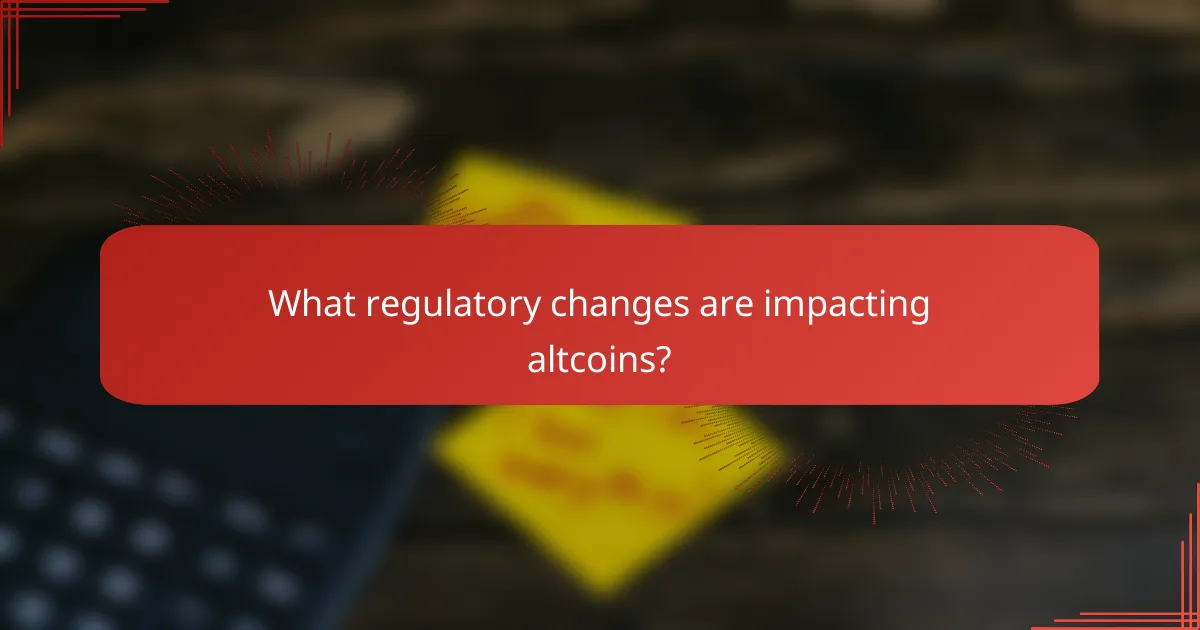
What regulatory changes are impacting altcoins?
Regulatory changes are significantly shaping the altcoin landscape, affecting how these cryptocurrencies are classified, traded, and taxed. Key developments in the United States and Europe are particularly influential, creating both opportunities and challenges for investors.
SEC regulations in the United States
The U.S. Securities and Exchange Commission (SEC) has been actively scrutinizing altcoins to determine whether they qualify as securities. This classification impacts how they can be marketed and traded, with potential implications for compliance and investor protections.
Investors should be aware that altcoins deemed securities may require registration and adherence to strict regulatory standards. Non-compliance can lead to significant penalties, making it crucial for investors to stay informed about the SEC’s evolving stance.
EU MiCA framework for crypto assets
The European Union’s Markets in Crypto-Assets (MiCA) framework aims to create a comprehensive regulatory environment for cryptocurrencies, including altcoins. This legislation is designed to enhance consumer protection and promote innovation while ensuring market integrity.
Under MiCA, altcoin issuers will need to provide clear information about their assets, including risks and rights associated with them. Investors should familiarize themselves with these requirements, as they will influence how altcoins are marketed and sold within the EU.
Tax implications for altcoin investors
Tax treatment of altcoins varies by jurisdiction, but many countries classify them as property or capital assets. This means that gains from altcoin trading may be subject to capital gains tax, which can range from low single digits to over 30%, depending on the holding period and local laws.
Investors should maintain detailed records of their transactions to accurately report gains or losses. Consulting with a tax professional familiar with cryptocurrency regulations is advisable to navigate the complexities of altcoin taxation effectively.

How to evaluate altcoin investment opportunities?
To evaluate altcoin investment opportunities, consider factors such as market capitalization, technology, use cases, and community support. These elements can help determine the potential for growth and stability in your investment.
Market capitalization analysis
Market capitalization is a key metric for assessing the size and potential of an altcoin. It is calculated by multiplying the current price of the coin by its total supply. Generally, altcoins with a market cap in the low millions may be riskier, while those in the hundreds of millions to billions often indicate more established projects.
When analyzing market cap, consider the coin’s rank within the broader cryptocurrency market. A higher rank usually suggests greater investor confidence and liquidity, making it easier to buy and sell the asset without significant price fluctuations.
Technology and use case assessment
Understanding the underlying technology and use case of an altcoin is crucial for evaluating its long-term viability. Look for coins that solve real-world problems or offer innovative solutions, such as decentralized finance (DeFi), non-fungible tokens (NFTs), or enhanced transaction speeds.
Research the technology behind the altcoin, including its blockchain protocol and consensus mechanism. Projects that utilize proven technologies or have unique features, such as smart contracts or interoperability with other blockchains, may present better investment opportunities.
Community and developer support
A strong community and active developer support are indicators of an altcoin’s potential success. Check online forums, social media channels, and developer activity on platforms like GitHub to gauge community engagement and ongoing development efforts.
Invest in altcoins with vibrant communities that actively discuss improvements and updates. A dedicated user base can drive adoption and increase the coin’s value, while a lack of support may signal underlying issues that could affect your investment negatively.
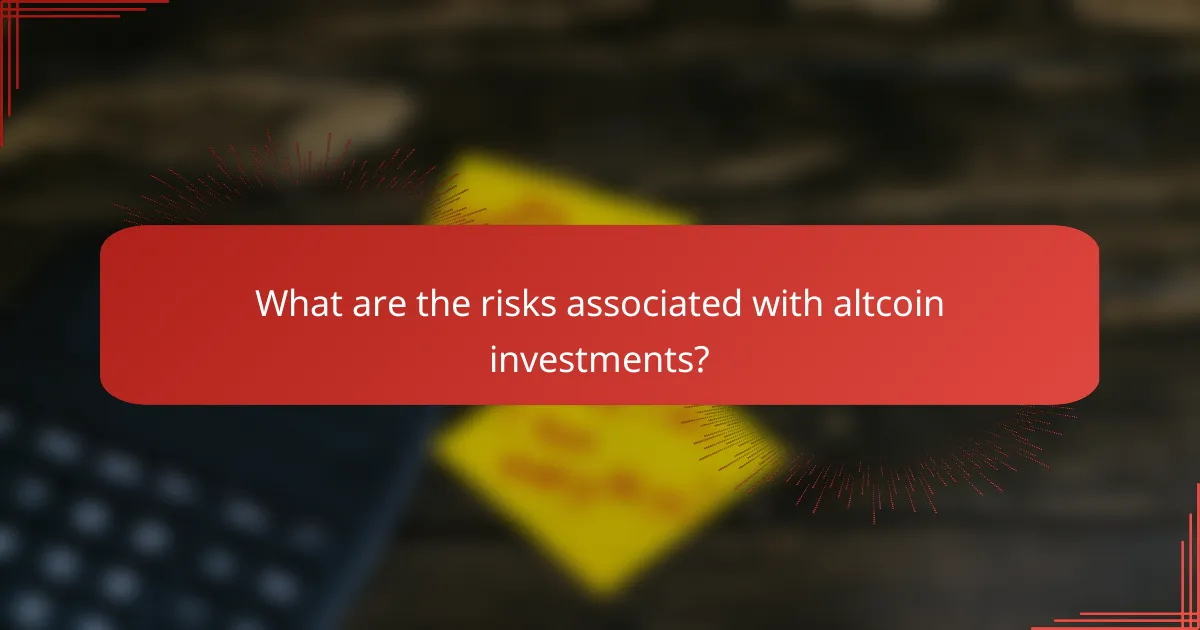
What are the risks associated with altcoin investments?
Investing in altcoins carries significant risks that can impact both financial returns and security. Key risks include market volatility, regulatory uncertainty, and security vulnerabilities, each of which can affect the stability and legality of altcoin investments.
Market volatility
Altcoins are known for their extreme price fluctuations, often experiencing rapid gains or losses within short periods. This volatility can be driven by market sentiment, news events, or technological developments, making it challenging for investors to predict price movements accurately.
Investors should be prepared for potential price swings of 20-30% or more in a single day. To manage this risk, consider setting stop-loss orders or diversifying your portfolio to mitigate the impact of sudden market changes.
Regulatory uncertainty
The regulatory landscape for altcoins is constantly evolving, with different countries adopting varying stances on their legality and use. This uncertainty can lead to sudden changes in market conditions, affecting the value and availability of certain altcoins.
Investors should stay informed about regulations in their jurisdiction, as well as any significant developments in major markets like the EU or the US. Engaging with legal experts or following reputable news sources can help navigate these complexities.
Security vulnerabilities
Altcoins are susceptible to security issues, including hacks, scams, and fraud. Many altcoin projects may not have the same level of security measures as established cryptocurrencies like Bitcoin or Ethereum, making them attractive targets for cybercriminals.
To protect your investments, use reputable wallets and exchanges, enable two-factor authentication, and be cautious of phishing attempts. Regularly updating your security practices can help safeguard your assets against potential threats.
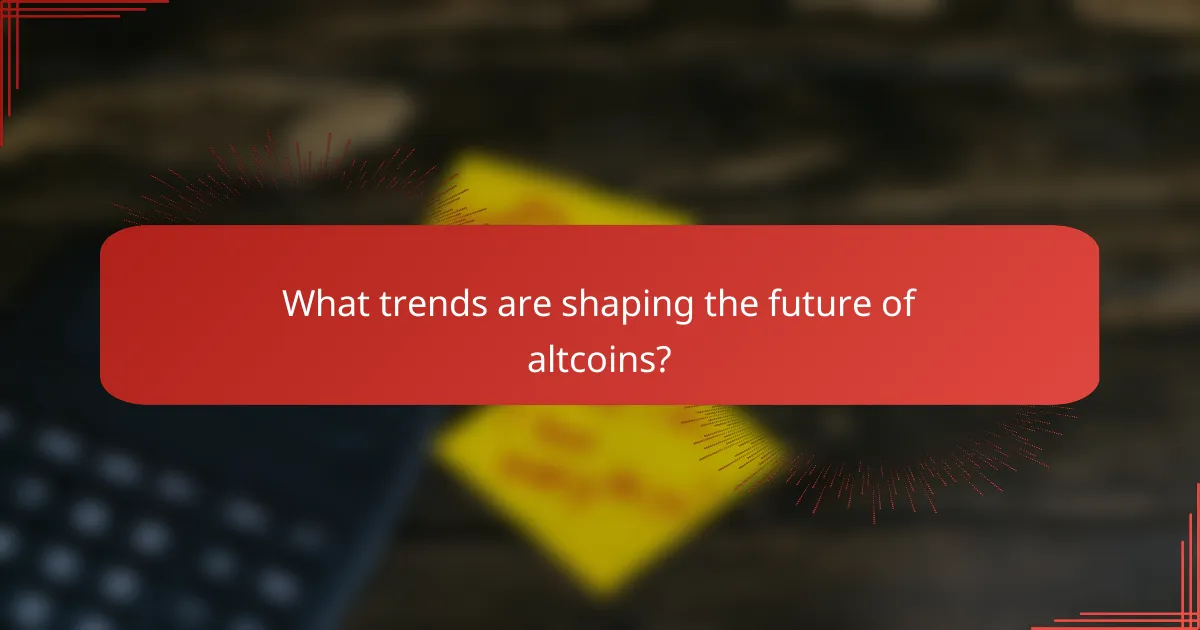
What trends are shaping the future of altcoins?
Several key trends are influencing the future of altcoins, including technological advancements, regulatory developments, and shifts in investor sentiment. These factors are driving innovation and adoption, making altcoins an increasingly significant part of the global financial landscape.
Technological advancements in altcoins
Technological improvements are crucial for the evolution of altcoins. Innovations like smart contracts, interoperability between blockchains, and enhanced security protocols are making altcoins more functional and appealing to users. For instance, platforms like Ethereum have paved the way for decentralized applications (dApps), which are expanding the use cases for altcoins.
Additionally, the rise of layer-2 solutions, such as the Lightning Network for Bitcoin, aims to improve transaction speeds and reduce costs. These advancements can help altcoins compete more effectively with traditional financial systems, enhancing their utility and adoption.
Regulatory changes impacting altcoins
Regulatory frameworks are rapidly evolving, significantly affecting the altcoin market. Governments worldwide are increasingly scrutinizing cryptocurrencies, leading to new regulations that can either foster growth or impose restrictions. For example, the European Union’s Markets in Crypto-Assets (MiCA) regulation aims to create a comprehensive framework for digital assets, which could provide clarity and stability for altcoin investors.
Investors should stay informed about local regulations, as compliance can vary significantly between jurisdictions. In the U.S., the SEC has taken a more aggressive stance on classifying certain altcoins as securities, which could impact their trading and development.
Shifts in investor sentiment towards altcoins
Investor sentiment is a powerful driver of altcoin trends. As more retail and institutional investors enter the market, interest in altcoins is growing. Factors such as social media influence, celebrity endorsements, and community engagement can lead to rapid price fluctuations and increased trading volumes.
Investors should be cautious, as sentiment-driven markets can lead to volatility. Diversifying investments across a range of altcoins and conducting thorough research can help mitigate risks associated with sudden market shifts.
